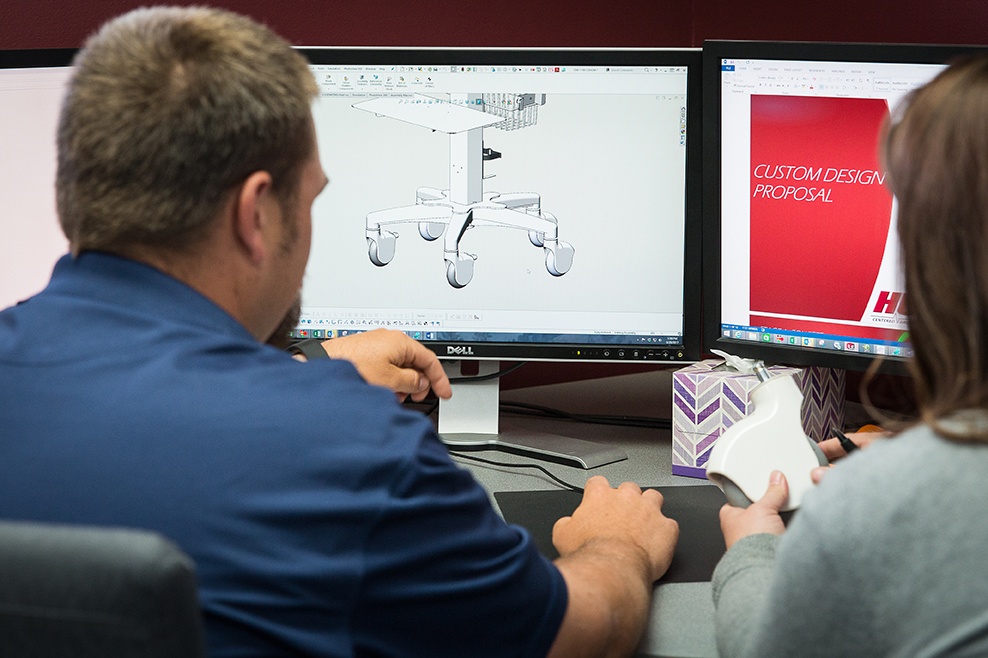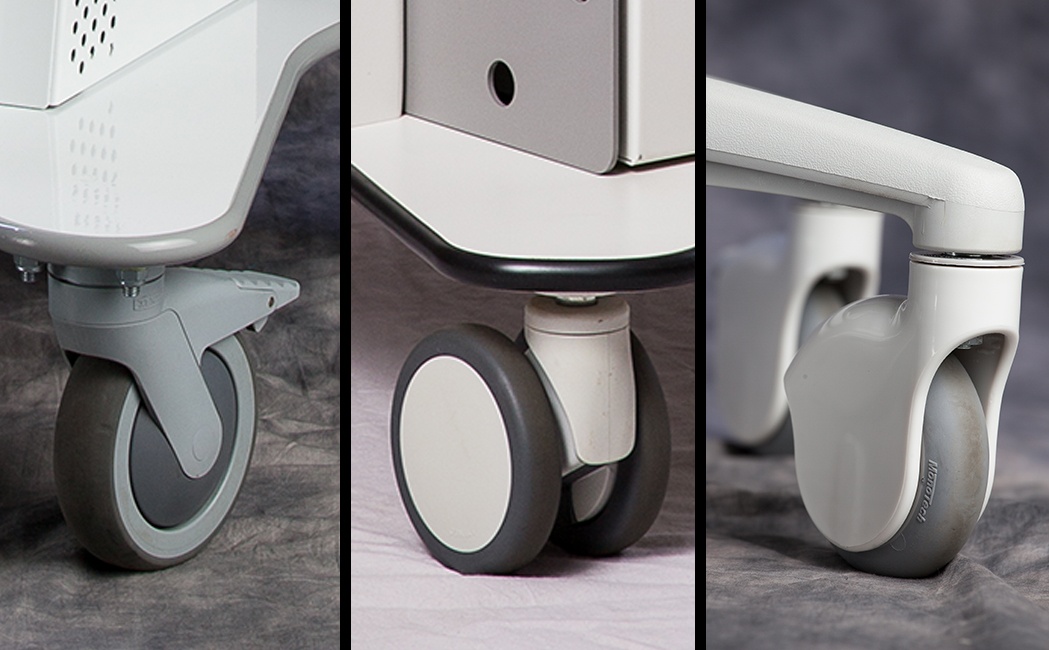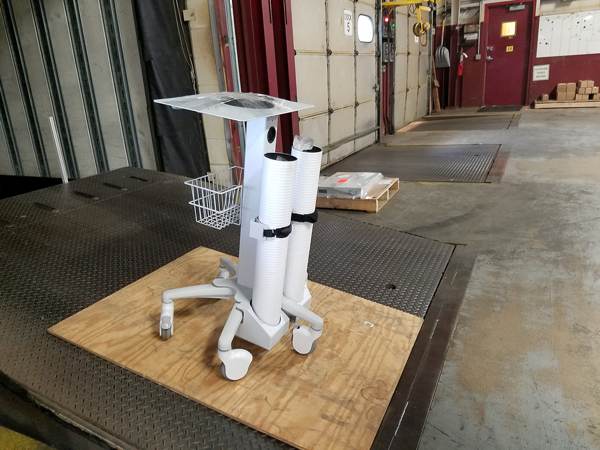
Medical carts offer mobility and proper ergonomics for medical devices, inventory, and diagnostic systems. Carts are an important feature in medical facilities, as they help healthcare staff stay organized on the go and provide them with the proper equipment to diagnose and care for their patients.
A well-designed medical cart not only improves the lives of patients and healthcare workers, it protects them. That’s why IEC 60601-1 compliance is so important for medical carts. The 60601 testing standards ensure your cart will function safely for all users. IEC 60601-1 compliance should be your first consideration when choosing or designing a medical cart.
The International Electrotechnical Committee (IEC) governs the design of medical equipment and determines safety standards that directly or indirectly relate to the handling, use or connection to, of medical equipment. The IEC 60601 standard is often simply referred to as IEC 601, and it consists of 2 parts: IEC 60601-1 and IEC 60601-2. Each part builds up from a number of basic or collateral standards.
IEC 60601-1 3rd edition is a series of technical standards for medical electrical equipment and are used as a basis to test their safety and effectiveness.
Accredited labs perform these tests to verify that your medical cart complies with these safety standards and takes the following features into account:

Knowing whether your medical cart needs to be IEC 60601-1 compliant starts with a simple question: is it a medical device? The answer isn’t always that simple, yet custom medical cart manufacturers need to determine it with each project. When asked, most customers base their answers on whether electronics or medical devices will be used with their carts. If so, compliance and certification will be necessary.
The main concern with using electronics in or on a medical cart is leakage current, especially if the cart is being used near patients with weakened immune systems or other conditions. IEC compliance ensures that, should a patient touch the cart, he or she doesn’t experience any complications due to stray voltage. For more information on leakage current standards, view this article by the Medical Device & Diagnostic Industry. HUI sends carts that need compliance testing to MECA, a testing lab with IEC 60601-1 3rd edition certification so they can officially grant the certification.
The IEC 60601-1 3rd edition consists of many different clauses, but a majority of them do not apply to medical carts. A lot of detail goes into each clause so, to help you better understand what each one entails, we created this cheat sheet to give you a quick overview of each applicable standard:
If you’re interested in viewing the full IEC 60601-1 standard, it can be purchased from the IEC Webstore.
Casters can be a point of confusion for many people looking into 60601-1 requirements. While you won’t find clauses detailing exactly what type of casters to include in your design, you do need casters that will pass each test.

Before you send your cart in to get it 60601-1 certified, it’s important to put it though sample tests ahead of time. At HUI, the team builds custom carts that are ready to pass 60601-1 standards and will perform these sample tests for you. However, if you require running these sample tests yourself, this infographic is a great place to get started:
After you’ve looked at the 60601-1 infographic for an overview, you may want more detailed information on each clause. We know how complicated each test can be, so we’ve broken them down into this collection of blog articles and video tutorials:
We want to go into more detail about 60601-1 updates, because we often get questions about what has changed with the 4th Edition of IEC 60601-1. As it turns out, that edition doesn’t exist yet and isn’t expected to be released for another 6-8 years.
The latest edition is 3rd Edition + Amendment 1 (Edition 3.1). There is also an Amendment 2 expected to come out in about a year, but its release has been delayed a few times. As of today, long as you are following Edition 3.1, you’re up-to-date. We'll provide information about any changes to the current edition as the new requirements for medical carts are released.

The IEC 60601-1 test is the most important test for getting your cart properly certified. However, there are other important tests you should consider as well. These tests will ensure you’re getting a high quality cart that’s built with longevity in mind:
The cost of 60601-1 testing will depend on multiple variables like the extent of testing required, documentation, risk management files, etc. The IEC 60601-1 3rd edition tests applicable to your custom medical cart can cost anywhere from 10K $20K. Most manufacturers will encourage customers to hold their own file and fees associated with 60601-1.
HUI often partners with MECA for 60601-1 certification. They assist medical companies with their safety certifications, compliance and regulatory needs, including design, development, safety certification and global regulatory support. They also provide 60601-1 testing training for each of our engineers.

MECA also provides great resources and informational downloads, including:
 Choosing the Right Medical Cart Partner
Choosing the Right Medical Cart PartnerWorking with a manufacturer that specializes in custom medical carts gives you a major advantage; they’ll have a baseline for what tests are most important and they’ll design your product with that criteria in mind.
You will want to invest in a custom medical cart specialist or manufacturer that has an intimate knowledge of 60601-1 practices and understands how to design to those standards. It’s even better if you form a partnership with a company that collaborates with an IEC 60601-1 certified lab.
IEC 60601-1 Cart Design Assessment.
The HUI team has been designing medical carts for almost three decades. We’ve collected new testing experience with every design and have seen and solved many different scenarios. For a free 60601-1 assessment of your current cart design, reach out and we’ll set up a time to talk. We’re eager to help you overcome your unique challenges!

HUI dedicates itself to helping our customers design the solutions they need and launching quality products on time and within budget.
10 E. Park Avenue
Kiel, WI 53042
Office: 920-894-2233
Toll-Free: 800-877-8913
Mon-Fri, 8am until 5pm
sales@huimfg.com
We reply within 24 hours